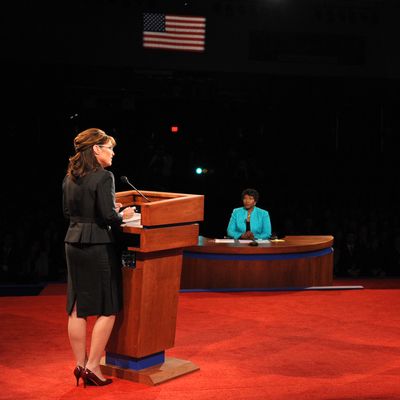

The Biden-Palin debate of 2008, which upstaged the presidential candidates.
Photo: Don Emmert-Pool/Getty Images
With relatively little drama (other than a couple of taunts by the Republican about his rival’s alleged reluctance to face him), vice-presidential nominees J.D. Vance and Tim Walz agreed this week to a debate on October 1 in New York, to be sponsored by CBS News. The event will be co-moderated by Face the Nation host Margaret Brennan and CBS Evening News anchor Norah O’Donnell. While these two men are relatively high-profile running mates, the history of vice-presidential debates suggests the New York encounter is unlikely to make a lot of difference to the November election results.
The main reason the Vance-Walz encounter might be of only passing interest is that there’s not much evidence veep candidates themselves make much difference — to the election results, at least. They may make a lot of difference to the administration in which they hope to serve, and quite a few eventually become presidential nominees and even presidents. As running mates, though, their main impact is typically to reinforce the message and persona of the presidential candidates who chose them, and thus it is difficult to untangle them from the overall success or failure of the campaign generally. The ideal veep candidate is so busy grinding away at the party line like a cicada that you don’t really see or hear them distinctly.
Accordingly, you could not be blamed for failing to remember past vice-presidential debates. But they have been held once every four years since 1976 (with the sole exception of 1980, when a dispute over the inclusion or exclusion of independent candidate Pat Lucey — John Anderson’s running mate — led to the cancellation of the debate). Here’s a look at some notable,, if not game-changing, moments from previous VP face-offs.
In the very first vice-presidential debate, Gerald Ford’s running mate, Bob Dole, created a stir by trying to deflect a question about his earlier criticism of Ford’s pardon of Richard Nixon by wheeling out an ancient isolationist trope of treating all the wars of the 20th century as “Democrat wars.”
Fritz Mondale pounced on the gaffe right away, but the exchange, the debate itself, and the vice-presidential candidates were not generally credited with a major effect on the very close outcome of the Ford-Carter contest.
The most notable exchange between George H.W. Bush and Geraldine Ferraro was her calling out Poppy for mansplaining foreign policy to her:
But this moment was probably overshadowed by future First Lady Barbara Bush’s description of Ferraro as “something that rhymes with ‘rich’.”
Mansplainer or not, Bush and his running mate, Ronald Reagan, won 49 states.
Most likely the biggest smackdown in vice-presidential debate history occurred in 1988, when the very callow Dan Quayle continued a habit of comparing his credentials to John F. Kennedy’s. The wily veteran politician Lloyd Bentsen came prepared and delivered the blow decisively:
The moment likely damaged Quayle’s already-shaky reputation, but it didn’t matter to the presidential race, which Quayle and George H.W. Bush won in a landslide over Bentsen and Mike Dukakis.
Typically, vice-presidential debates draw significantly lower viewership than presidential debates, as you might guess. In 2000, for example, the debate between Dick Cheney and Joe Lieberman drew just over half the audience won by the first Gore-Bush debate. But there was one exception: In 2008, the Joe Biden–Sarah Palin debate has significantly higher viewership than any of the three Obama-McCain debates, likely reflecting Palin’s novelty and momentary pop-culture status. It was no blowout, but Biden did get in a dig at Palin by comparing a McCain health-care plan to a “bridge to nowhere,” a term Palin had made famous in criticizing a project in Alaska:
You can also marvel at how sharp Biden was in 2008.
Much like Geraldine Ferraro in 1984, in 2020 Kamala Harris had an opportunity to rebuke a mansplainer, in this case Mike Pence:
Soon we will know if Vance and Walz will give us a memorable moment or two or fade into obscurity like the debates that truly have been forgotten (Like Pence-Kaine. Did it really happen? Who knows?)
Source link






